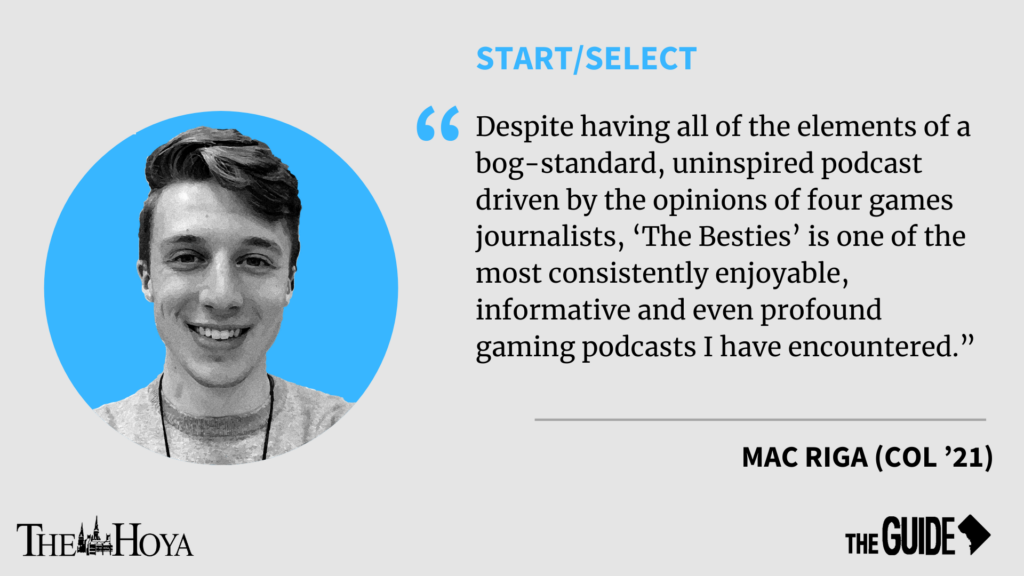Game of the Year lists are the bane of games journalism. At best, an audience recognizes how such lists are reflective of personal opinions and greatest common denominators. Ultimately, lists viewed this way can offer little more than educated suggestions. At worst, folks take the practice at face value.
Of course, I understand the appeal: Our reptile brains cannot help but try and make hierarchies of our experiences. This phenomenon especially rings true when it means recognizing things we admire. But in most cases, the practice is wholly unhelpful. Readers, unfortunately, earnestly buy into the notion that any art can be objectively ranked in a worthwhile way. Different games represent different expressions and utilizations of the medium; trying to determine a definitive pecking order is asinine.
Given my distaste for GOTY lists, it is surprising that I should be recommending “The Besties.” The formerly Polygon-affiliated podcast is a self-described “yearlong Game of the Year” contest. The specific format has changed many times since its inception, but the core concept remains the same. Four hosts — Griffin McElroy, Justin McElroy, Russ Frushtick and Chris Plante — analyze new games throughout the year. Come December, their discussions culminate in a massive GOTY bracket of the years’ releases.
Despite having all of the elements of a bog-standard, uninspired podcast driven by the opinions of four games journalists, “The Besties” is one of the most consistently enjoyable, informative and even profound gaming podcasts I have encountered.
Perhaps the greatest contributing factor to the show’s success is its self-awareness. The hosts routinely acknowledge the failings of the GOTY format and implore the listener not to take their word as gospel. Having made this acknowledgment, a lesser show might be rendered impotent, crushed by the weight of its own conceit. “The Besties,” however, is liberated by it. Freed from the typical format’s shackles, the hosts are able to approach the games they cover from all perspectives.
The hosts dissect games’ highs and lows with no concern for maintaining one game’s reputation as the unimpeachable best, as other GOTY lists do. Furthermore, they make it clear when their personal relationships to series, developers and games influence their opinions. The hosts appreciate the successes of one another’s choices for GOTY and admit the failings of their own. In short, their concern becomes not the end result of comparatively ranking games, but the very process of reviewing them. Irrespective of their final “ranking,” the analyses of the titles offered are fair, relatable and comprehensive.
The quality of game review in “The Besties” is no surprise given that the hosts are industry veterans. All four were part of the team that founded Polygon, one of games journalism’s most prestigious outlets. Their intimate knowledge of the field and consummate love for the medium enhance their reviews greatly. Each title they review is contextualized within trends in gaming culture, the history of development teams or the legacy of spiritual predecessors.
The hosts back their opinions with storied experience and no small degree of gaming theory. Many gaming outlets tend to streamline reviews for the sake of search engine optimization and mass appeal. By contrast, “The Besties” does not shy from digging deep into the nitty-gritty of every game it reviews. The result is a collection of supremely in-depth reviews that reveal exactly how and why the games tick.
Despite the hosts’ professionalism and expertise, “The Besties” feels intensely approachable. Its hosts are always concise and clear in explaining the concepts at play, but never in a way that condescends to their audience. Additionally, their technical talk is always tempered with experience-driven personal anecdotes. As a competitor, I have found that “The Besties” captures my personal experience competing better than any reviews I read. And of course, the show is hilarious. The hosts were friends before they were colleagues, and their rapport is infectiously fun. Jokes and friendly jabs take up almost as much time as the reviews themselves. The hosts ensure the show’s pace never lags and that the tone is always lighthearted.
I recognize that it is a bit out of left field for me to review a gaming podcast. Under normal circumstances, I probably would not use this platform as a clear plug for a program. In truth, the future of “The Besties” is in peril. The show is currently without a sponsor or network. As a result, its hosts have put out an impassioned plea for a show of support to ensure the show gets picked up.
“The Besties” was one of the main reasons I decided to review games. It has influenced my journalistic style, my personal taste and my opinions on games. It is an important show for me, and I have a vested interest in its continued flourishing. Everything I have written here is the truth; “The Besties” is remarkable and is something worth saving. If you are reading my column, then presumably you have at least a passing interest in gaming. As such, I cannot recommend “The Besties” more strongly. Take my word for it and go give it a try right now. I think you too will find it is something special.














